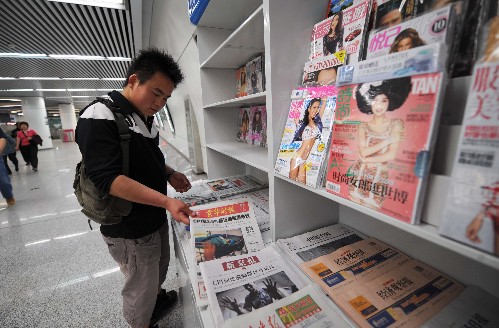|
 |
|
SHELF LIFE: How will print media survive in a digital age?(LI WENNIE) |
The Washington Post recently put up for sale the magazine Newsweek, prompting speculation that a Chinese company may buy up the American publication. Regardless of what happens, there seems to be a consensus in the West that print media is finally dying out. But this is a conversation that has been going on for decades. When television began to dominate the mediascape years back, people thought it would kill publishing, too. It didn't. The digital age may be poised to do what television couldn't, though. In the Western world, more and more people are turning to news outlets online. By contrast, print media continues to sell in China and across Africa. Muhammad Mansour, an Egyptian journalist, and Chen Kaihe, an associate professor at Peking University's School of Journalism and Communication discuss the dichotomy.
New Outlets, New Perspectives
by Muhammad Mansour
In 2002, I was a fresh graduate with a burning ambition to work for Egypt's largest newspaper Al-Ahram. Unfortunately, I couldn't convince editors at the state-owned institution to hire me.
At the time, Al-Ahram was the dominant player in news. Ever since its first August 5, 1876 issue, it had boasted the largest circulation in the country. But the paper's rosy days ended in 2004-05, as independent and opposition newspapers hit the newsstands, exposing government corruption and lashing out at a president who had previously been above criticism.
Not long after, the government opened space for freedom of speech. Despite the huge budget and institutional advantages state papers enjoyed, new papers like Al-Masry Al-Youm, financed by businessmen, became favored by readers. Al-Masry Al-Youm has a circulation of 136,000 copies a day, which is still lower than Al-Ahram (reportedly selling 355,000 a day), but the state paper's circulation has decreased remarkably. In the past, it boasted a daily circulation of 2 million. In this environment, I didn't regret not having had the chance to work for Al-Ahram – I knew I wouldn't have been able to write as freely as I wanted.
State papers were worst hit by the new wave of private papers, but Egypt's whole mediascape has shifted toward digital media and online journalism. Due to economic difficulties faced by media institutions, circulation of all print papers in Egypt is decreasing. A wave of new media like blogs, citizen journalism and private TV channels is rising, free to discuss any topic no matter how sensitive for the regime.
At the beginning of my journalism career in 2002 the Internet wasn't widespread. I didn't know much about it. Now, I can use it efficiently, and am not limited to listening to just one voice. Interestingly, print papers sometimes rely on and republish scoops from bloggers who rush to the scene of an incident before staff reporters are able to. In 2006, there was mass sexual harassment happening in Cairo's downtown. State newspapers described it as a rumor until one blogger posted a video clip on his blog, receiving millions of hits.
Talk shows are must-see TV news programs for most of Egyptians. The Internet is used mostly by young people, but all people from all generations and walks of life watch talk shows on a daily basis. The business of launching new channels is booming. Egyptians inundated with thousands of satellite TV channels are able to choose and single out what is worthy of watching.
As a journalist in Egypt whose beat is Egypt, the Middle East and Africa, I can't do without watching the Qatari-based Aljazeera TV news channel and talk shows broadcast on satellite channels. I also prefer surfing newspapers online rather than being burdened with going and buying print copies.
A friend of mine who is a staff journalist at one of Arabic newspapers and has a blog told me he believes that newspapers will find a way to cope, and that by virtue of their professionalism and adherence to journalistic ethics, they will provide a necessary counterweight to blogs, social media and citizen journalism.
I personally believe that print journalism in Africa won't die out, but it definitely won't have the same circulation as before, and will be ranked second after digital media. In Egypt, private newspapers are trying to ride the new wave of digital media in a way that enables readers not only to be fed news, but also op-eds that let them interact and contribute. Al-Masry Al-Youm has launched an online edition to attract more readers; some news outlets have skipped the print stage completely, establishing themselves as exclusively online presences.
I think that the growth of digital media in developing countries, particularly in Egypt, is stronger than in the West, perhaps because of restrictions imposed on print journalism. People seeking an outlet online find journalism that reflects their sentiments.
|